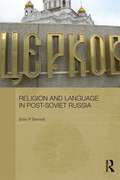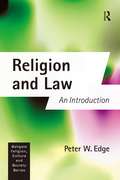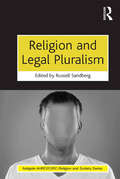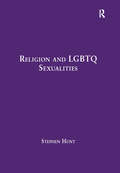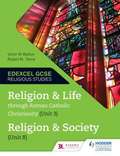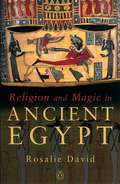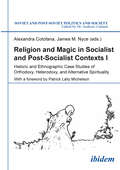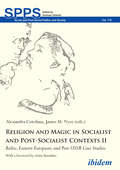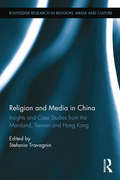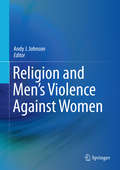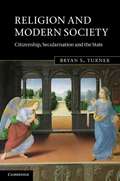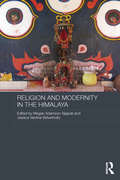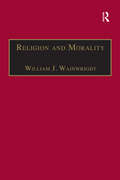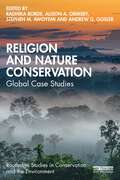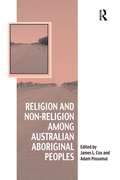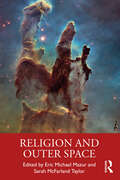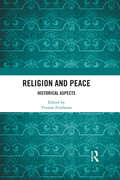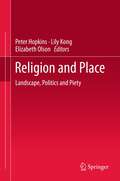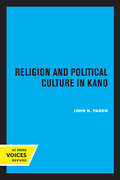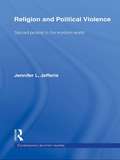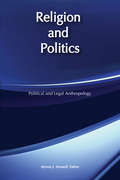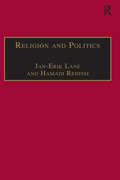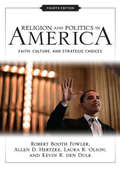- Table View
- List View
Religion and Language in Post-Soviet Russia (Routledge Contemporary Russia and Eastern Europe Series)
by Brian P. BennettChurch Slavonic, one of the world's historic sacred languages, has experienced a revival in post-Soviet Russia. Blending religious studies and sociolinguistics, this is the first book devoted to Church Slavonic in the contemporary period. It is not a narrow study in linguistics, but uses Slavonic as a passkey into various wider topics, including the renewal and factionalism of the Orthodox Church; the transformation of the Russian language; and the debates about protecting the nation from Western cults and culture. It considers both official and popular forms of Orthodox Christianity, as well as Russia's esoteric and neo-pagan traditions. Ranging over such diverse areas as liturgy, pedagogy, typography, mythology, and conspiracy theory, the book illuminates the complex interrelationship between language and faith in post-communist society, and shows how Slavonic has performed important symbolic work during a momentous chapter in Russian history. It is of great interest to scholars of sociolinguistics and of religion, as well as to Russian studies specialists.
Religion and Law: An Introduction (Religion, Culture and Society Series)
by Peter W. EdgeDiscussion of the way in which law engages with religious difference often takes place within the context of a single jurisdiction. Religion and Law: An Introduction, presents a comprehensive text for students, drawing on examples from across key Anglophone jurisdictions - the United Kingdom, the United States, Canada, New Zealand, Australia and South Africa, as well as international law, to explore a broad range of issues. Aimed at a non-legal readership, this book introduces the use of legal sources and focuses on factual situations as much as legal doctrine. Key issues arising from interaction of the religious individual and the State are discussed, as well as the religious organisation or community and the State. The interaction is explored through case studies of areas as diverse as the legal regulation of religious drug use, sacred spaces and sacred places, and claims of clergy misconduct. Taking a broad, non-jurisdictional approach to the key issues, in particular providing insights differing from the dominant US experiences and paradigms, this student-friendly textbook includes a clearly structured bibliography and clear guidance on how to approach relevant legal materials.
Religion and Legal Pluralism (AHRC/ESRC Religion and Society Series)
by Russell SandbergIn recent years, there have been a number of concerns about the recognition of religious laws and the existence of religious courts and tribunals. There has also been the growing literature on legal pluralism which seeks to understand how more than one legal system can and should exist within one social space. However, whilst a number of important theoretical works concerning legal pluralism in the context of cultural rights have been published, little has been published specifically on religion. Religion and Legal Pluralism explores the extent to which religious laws are already recognised by the state and the extent to which religious legal systems, such as Sharia law, should be accommodated.
Religion and LGBTQ Sexualities: Critical Essays
by Stephen HuntThis compiled and edited collection engages with a theme which is increasingly attracting scholarly attention, namely, religion and LGBTQ sexuality. Each section of the volume provides perspectives to understanding academic discourse and wide-ranging debates around LGBTQ sexualities and religion and spirituality. The collection also draws attention to aspects of religiosity that shape the lived experiences of LGBTQ people and shows how sexual orientation forges dimensions of faith and spirituality. Taken together the essays represent an exploration of contestations around sexual diversity in the major religions; the search of sexual minorities for spiritual ’safe spaces’ in both established and new forms of religiosity; and spiritual paths formed in reconciling and expressing faith and sexual orientation. This collection, which features contributions from a number of disciplines including sociology, anthropology, psychology, history, religious studies and theology, provides an indispensable teaching resource for educators and students in an era when LGBTQ topics are increasingly finding their way onto numerous undergraduate, post-graduate and profession orientated programmes.
Religion and Life through Roman Catholic Christianity (Unit #8)
by Robert M. Stone Victor W. WattonThe only book on the market to bring together Unit 3 and Unit 8 from the Edexcel GCSE Religious Studies specification, ensuring that students have everything they need in one place. - Engages students with each area of the specification through quotes, summaries and questions for every topic - Helps students prepare for assessment with up-to-date guidance including exam-style questions, sample student answers and advice - Offers a full-course book from best-selling author Victor Watton drawing on his many years' experience writing textbooks and learning resources
Religion and Magic in Ancient Egypt
by Rosalie DavidThe ancient Egyptians believed that the Nile - their life source - was a divine gift. Religion and magic permeated their civilization, and this book provides a unique insight into their religious beliefs and practices, from 5000 BC to the 4th century AD, when Egyptian Christianity replaced the earlier customs. Arranged chronologically, this book provides a fascinating introduction to the world of half-human/ half-animal gods and goddesses; death rituals, the afterlife and mummification; the cult of sacred animals, pyramids, magic and medicine. An appendix contains translations of Ancient Eygtian spells.
Religion and Magic in Socialist and Post-Socialist Contexts: Historic and Ethnographic Case Studies of Orthodoxy, Heterodoxy, and Alternative Spirituality (Soviet and Post-Soviet Politics and Society #163)
by Alexandra Cotofana James M. NyceReligion and magic have played important roles within Eastern European societies where social reality and sociopolitical balance may differ greatly from those in the West. Although often thought of as being two distinct, even antagonistic forces, religion and magic find ways to work together. By taking on various examples in the multicultural settings of post-Soviet and postsocialist spaces, this collection brings together diverse historical and ethnographic analyses of orthodoxy and heterodoxy from the pre- and post-1989 periods, studies on the relationship of religious and state institutions to individuals practicing alternative forms of spirituality, and examples of borderlands as spaces of ambiguity. This volume is at the crossroads of anthropology, history, as well as cultural memory studies. Its archival and field research findings help understand how repurposing religious and magic practices worked into the transition that countries in Eastern Europe and beyond have experienced after the end of the Cold War.
Religion and Magic in Socialist and Post-Socialist Contexts II: Baltic, Eastern European, and Post-USSR Case Studies (Soviet and Post-Soviet Politics and Society #173)
by Alexandra Cotofana James M. NyceReligion and magic have often played important roles in Baltic, Eastern European, and post-Soviet societies like those in Russia, Romania, Serbia, Latvia, Kyrgyzstan, and Estonia. Taken together, the studies presented in this collection suggest that the idea that religion and magic are connected to each other in some consistent, universal way may be nothing more than a remnant from nineteenth-century anthropology. Further, these studies challenge another part of anthropology's historical legacy: the idea that magic is something that modernity and modernization will transcend. Rather, these studies suggest instead that magic is a form of work that brings modernity into being and helps render it intelligible to those who find themselves engaged in its creation.This volume brings together historical (pre- and post-1989), ethnographic, and area studies that look at the divergent roles of state, culture, society, tradition, and the individual in enactments of magic and religion. Assessing the role magic and religion have played in the countries of Eastern Europe and beyond before and after the Cold War, it is an absorbing read for scholars of anthropology and history as well as ethnology.
Religion and Media in China: Insights and Case Studies from the Mainland, Taiwan and Hong Kong (Routledge Research in Religion, Media and Culture)
by Stefania TravagninThis volume focuses on the intersection of religion and media in China, bringing interdisciplinary approaches to bear on the role of religion in the lives of individuals and greater shifts within Chinese society in an increasingly media-saturated environment. With case studies focusing on Mainland China (including Tibet), Hong Kong and Taiwan, as well as diasporic Chinese communities outside Asia, contributors consider topics including the historical and ideological roots of media representations of religion, expressions of religious faith online and in social media, state intervention (through both censorship and propaganda), religious institutions’ and communities’ use of various forms of media, and the role of the media in relations between online/offline and local/diaspora communities. Chapters engage with the major religious traditions practiced in contemporary China, namely Buddhism, Daoism, Confucianism, Christianity, Islam, and new religious movements. Religion and the Media in China serves as a critical survey of case studies and suggests theoretical and methodological tools for a thorough and systematic study of religion in modern China. Contributors to the volume include historians of religion, sinologists, sociologists, political scientists, anthropologists, and media and communication scholars. The critical theories that contributors develop around key concepts in religion—such as authority, community, church, ethics, pilgrimage, ritual, text, and practice—contribute to advancing the emerging field of religion and media studies.
Religion and Men's Violence Against Women
by Andy J. JohnsonThis reference offers the nuanced understanding and practical guidance needed to address domestic violence, sexual assault, and human trafficking in diverse religious communities. Introductory chapters sort through the complexities, from abusers' distorting of sacred texts to justifying their actions to survivors' conflicting feelings toward their faith. The core of the book surveys findings on gender violence across Christian, Jewish, Islamic, Eastern, and Indigenous traditions--both attitudes that promote abuse and spiritual resources that can be used to promote healing. Best practices are included for appropriate treatment of survivors, their children, and abusers; and for partnering with communities and clergy toward stemming violence against women. Among the topics featured: Ecclesiastical policies vs. lived social relationships: gender parity, attitudes, and ethics. Women's spiritual struggles and resources to cope with intimate partner aggression. Christian stereotypes and violence against North America's native women. Addressing intimate partner violence in rural church communities. Collaboration between community service agencies and faith-based institutions. Providing hope in faith communities: creating a domestic violence policy for families. Religion and Men's Violence against Women will gain a wide audience among psychologists, social workers, marriage and family therapists, and other mental health professionals who treat religious clients or specialize in treating survivors and perpetrators of domestic and intimate partner violence, stalking, sexual assault, rape, or human trafficking.
Religion and Modern Society
by Bryan S. TurnerReligion is now high on the public agenda, with recent events focusing the world's attention on Islam in particular. This book provides a unique historical and comparative analysis of the place of religion in the emergence of modern secular society. Bryan S. Turner considers the problems of multicultural, multi-faith societies and legal pluralism in terms of citizenship and the state, with special emphasis on the problems of defining religion and the sacred in the secularisation debate. He explores a range of issues central to current debates: the secularisation thesis itself, the communications revolution, the rise of youth spirituality, feminism, piety and religious revival. Religion and Modern Society contributes to political and ethical controversies through discussions of cosmopolitanism, religion and globalisation. It concludes with a pessimistic analysis of the erosion of the social in modern society and the inability of new religions to provide 'social repair'.
Religion and Modernity in the Himalaya (Routledge Contemporary South Asia Series)
by Megan Adamson Sijapati Jessica Vantine BirkenholtzReligion has long been a powerful cultural, social, and political force in the Himalaya. Increased economic and cultural flows, growth in tourism, and new forms of governance and media, however, have brought significant changes to the religious traditions of the region in the twentieth and twenty-first centuries. This book presents detailed case studies of lived religion in the Himalaya in this context of rapid change to offer intra-regional perspectives on the ways in which lived religions are being re-configured or re-imagined. Based on original fieldwork, this book documents understudied forms of religion in the region and presents unique perspectives on the phenomenon and experience of religion, discussing why, when, and where practices, discourses, and the category of religion itself, are engaged by varying communities in the region. It yields fruitful insights into both the religious traditions and lived human experiences of Himalayan peoples in the modern era. Presenting new research and perspectives on the Himalayan region, this book should be of interest to students and scholars of South Asian Studies, Religious Studies, and Modernity.
Religion and Morality (Routledge Philosophy of Religion Series)
by William J. WainwrightReligion and Morality addresses central issues arising from religion's relation to morality. Part I offers a sympathetic but critical appraisal of the claim that features of morality provide evidence for the truth of religious belief. Part II examines divine command theories, objections to them, and positive arguments in their support. Part III explores tensions between human morality, as ordinarily understood, and religious requirements by discussing such issues as the conflict between Buddhist and Christian pacifism and requirements of justice, whether 'virtue' without a love of God is really a vice, whether the God of the Abrahamic religions could require us to do something that seems clearly immoral, and the ambiguous relations between religious mysticism and moral behavior. Covering a broad range of topics, this book draws on both historical and contemporary literature, and explores afresh central issues of morality and religion offering new insights for students, academics and the general reader interested in philosophy and religion.
Religion and Nationalism in Southeast Asia
by Joseph Chinyong LiowReligion and nationalism are two of the most potent and enduring forces that have shaped the modern world. Yet, there has been little systematic study of how these two forces have interacted to provide powerful impetus for mobilization in Southeast Asia, a region where religious identities are as strong as nationalist impulses. At the heart of many religious conflicts in Southeast Asia lies competing conceptions of nation and nationhood, identity and belonging, and loyalty and legitimacy. In this accessible and timely study, Joseph Liow examines the ways in which religious identity nourishes collective consciousness of a people who see themselves as a nation, perhaps even as a constituent part of a nation, but anchored in shared faith. Drawing on case studies from across the region, Liow argues that this serves both as a vital element of identity and a means through which issues of rights and legitimacy are understood.
Religion and Nature Conservation: Global Case Studies (Routledge Studies in Conservation and the Environment)
by Radhika Borde Alison A Ormsby Stephen M Awoyemi Andrew G GoslerThis book presents a broad array of global case studies exploring the interaction between religion and the conservation of nature, from the viewpoints of the religious practitioners themselves. With conservation and religion often being championed as allies in the quest for a sustainable world where humans and nature flourish, this book provides a much-needed compendium of detailed examples where religion and conservation science have been brought together. Case studies cover a variety of religions, faiths and practices, including traditional, Indigenous, Buddhism, Christianity, Hinduism, Islam, Jainism, Judaism, Shinto and Zoroastrianism. Importantly, this volume gives voice to the religious practitioners and adherents themselves. Beyond an exercise in anthropology, ethnobiology and comparative religion, the book is an applied work, seeking the answer to how in a world of nearly eight billion people, we might help our own species to prevent the extinction of life. This book will be of great interest to students and scholars of nature conservation, environment and religion, cultural geography and ethnobiology, as well as practitioners and professionals working in conservation.
Religion and Non-Religion among Australian Aboriginal Peoples (Vitality of Indigenous Religions)
by Adam Possamai James L. CoxOffering a significant contribution to the emerging field of 'Non-Religion Studies', Religion and Non-Religion among Australian Aboriginal Peoples draws on Australian 2011 Census statistics to ask whether the Indigenous Australian population, like the wider Australian society, is becoming increasingly secularised or whether there are other explanations for the surprisingly high percentage of Aboriginal people in Australia who state that they have 'no religion'. Contributors from a range of disciplines consider three central questions: How do Aboriginal Australians understand or interpret what Westerners have called 'religion'? Do Aboriginal Australians distinguish being 'religious' from being 'non-religious'? How have modernity and Christianity affected Indigenous understandings of 'religion'? These questions re-focus Western-dominated concerns with the decline or revival of religion, by incorporating how Indigenous Australians have responded to modernity, how modernity has affected Indigenous peoples' religious behaviours and perceptions, and how variations of response can be found in rural and urban contexts.
Religion and Outer Space
by Eric Michael Mazur Sarah McFarland TaylorReligion and Outer Space examines religion in and on the final frontier. This book offers a first-of-its-kind roadmap for thinking about complex encounters of religion and outer space. A multidisciplinary group of scholarly experts takes up some of the most intriguing scientific, spiritual, trade/commercial, and even military dimensions of the complex entanglements of religion and outer space. Attending to the historical reality that the interconnections between religion and the heavens are as old as religions themselves, the volume starts with an examination of "outer space" elements in the most sacred writings of the world’s religions. It then explores some of the religious questions inevitable in this encounter, analyzing cultural constructions (both literary and actual) of religion and outer space. It ends with examinations of the role of religion in the very real and very present business of space exploration. What might motivate the spread of religion (or at least fantasies of religion in its myriad possibilities) into new interior and exterior dimensions of the cosmos? Only the future will tell. Religion and Outer Space is essential reading for students and academics with an interest in religion and space, religion and science, space exploration, religion and science fiction, popular culture, and religion in America.
Religion and Peace: Historical Aspects
by Yvonne FriedmanThis volume represents a departure from the prevailing emphasis on religion and war in the medieval and early modern periods. Instead, the book explores the relationship between religion and peace in the context of Christianity, Islam, and Judaism, both as an ideal and on the practical level. The Introduction, which proposes a holistic model for analysis of violence/nonviolence-peace, provides a framework for understanding the various aspects of peacemaking during the period in question. The topics covered range from religion and diplomacy, peace movements grounded in religious ideals, the Muslim ideal of peace and actual peacemaking, Muslim-Christian treaties in the Latin East, papal policy in the Middle Ages and the twentieth century, the unique role of holy women who were spokeswomen for peace, the internal pursuit of peace in medieval Jewish society, and what fuelled religious tolerance in sixteenth-century Poland. As a whole, these chapters reflect how different societies reacted to and treated the “Other” in the context of peacemaking and overcame the conceptual gap with their ideology that promoted the belief that they possessed the one and only truth. They demonstrate that religion and religious institutions can serve as a positive influence and agents of peace.
Religion and Place
by Peter Hopkins Elizabeth Olson Lily KongThis unique collection highlights the importance of landscape, politics and piety to our understandings of religion and place. The geographies of religion have developed rapidly in the last couple of decades and this book provides both a conceptual framing of the key issues and debates involved, and rich illustrations through empirical case studies. The chapters span the discipline of human geography and cover contexts as diverse as veiling in Turkey, religious landscapes in rural Peru, and refugees and faith in South Africa. A number of prominent scholars and emerging researchers examine topical themes in each engaging chapter with significant foci being: religious transnationalism and religious landscapes; gendering of religious identities and contexts; fashion, faith and the body; identity, resistance and belief; immigrant identities, citizenship and spaces of belief; alternative spiritualities and places of retreat and enchantment. Together they make a series of important contributions that illuminate the central role of geography to the meaning and implications of lived religion, public piety and religious embodiment. As such, this collection will be of much interest to researchers and students working on topics relating to religion and place, including human geographers, sociologists, religious studies and religious education scholars.
Religion and Political Culture in Kano
by John N. PadenThis title is part of UC Press's Voices Revived program, which commemorates University of California Press’s mission to seek out and cultivate the brightest minds and give them voice, reach, and impact. Drawing on a backlist dating to 1893, Voices Revived makes high-quality, peer-reviewed scholarship accessible once again using print-on-demand technology. This title was originally published in 1973.
Religion and Political Violence: Sacred Protest in the Modern World (Contemporary Terrorism Studies)
by Jennifer L. JefferisThis book uses the theory of social movements and first-hand interviews to create a new analysis of religiously motivated political violence in the modern world. Examining the movement to restore Sharia law to a dominant place in the Egyptian government, the movement to make abortion illegal in the United States, and the religious effort to secure territory in Israel, the author contends that religion becomes violent not because of ideology or political context alone, but because of the constantly evolving relationship between them. The ebb and flow of opportunities for political access ensures that secularization and religion, although polar opposites, depend on each other to define themselves. As a result, while their respective degrees of influence will inevitably undulate over time, both will remain a part of the political process for some time. Thus, a full understanding of both is critical to a meaningful understanding of the political process. Much work has been done to understand secular social movements as part of the political process, and consequentially researchers now know a great deal about the motivations, resources and timing of secular social movements. Considerably less research has been done in the field of religious social movements and this book fills that gap in the literature. This book will be of great interest to students of political violence, religion, sociology, and Politics and International Relations in general. Jennifer Jefferis is Assistant Professor in the Department of Government, Regent University, USA, and has a PhD in Political Science from Boston University.
Religion and Politics: Religion And Politics
by Myron J. AronoffThis third volume in the outstanding series makes important new contributions to our understanding of the process whereby individuals and groups attribute meanings to the political structures and communities they create or inherit. Avoiding simplistic distinctions between religion and politics, each of these essays suggests more satisfactory ways of approaching the complex nature of these dynamic phenomena. They explore the role of traditional religious values, symbols, affiliations, and/or leaders in dealing with contemporary sociopolitical realities, analyzing the way in which religious traditions help shape the understanding and meaning of contemporary political realities and how they are reinterpreted and used to accomplish political and religious goals.
Religion and Politics: Islam and Muslim Civilisation
by Jan-Erik Lane Hamadi RedissiOffering a timely new appraisal of the political and social impact of Islam, Religion and Politics will be welcomed by political scientists and historians alike. In this work, Jan-Erik Lane and Hamadi Redissi employ a Weberian approach, underlining the social consequences of religious beliefs, to account for the political differences between the major civilizations of the world against the background of the rise of modern capitalism in the Occidental sphere. Compared with Weber and his emphasis upon economic modernization, the perspective on religion is broadened to encompass post-modernity; particular attention is paid to human rights and the rule of law. This thought-provoking work raises the question of whether the tenets of Islam might be reconciled with the requirements of post-modernity.
Religion and Politics in America
by Robert Booth Fowler Allen D. HertzkeReligion and politics are never far from the headlines, but their relationship remains complex and often confusing. Religion and Politics in America offers a lively, accessible, and balanced treatment of religion in American politics. The authors explore the historical, cultural, and legal contexts that underlie religious political engagement while also highlighting the pragmatic and strategic political realities that religious organizations and people face today. Incorporating up-to-date scholarship and analysis of voting behavior through the 2008 elections, the fourth edition assesses the politics of conventional and not-so-conventional American religious movements. Features include contemporary case studies, useful focus-study boxes, and timely discussions of Islam, Latinos, international affairs, and political culture.
Religion and Politics in America
by Robert Booth Fowler Allen D. HertzkeReligion and politics are never far from the headlines, but their relationship remains complex and often confusing. In this significantly revised third edition ofReligion and Politics in America, the authors offer an accessible and balanced treatment of religion in American politics. They explore the historical, cultural, and legal contexts that underlie religious engagement while also highlighting the pragmatic and strategic political realities that religious organizations and people face. Incorporating the best and most up-to-date scholarship, the authors assess the politics of Roman Catholics; evangelical, mainline, and African American Protestants; Jews; Muslims and other conventional and not-so-conventional American religious movements. The work examines important subjects concerning religion and its relationship to gender, race, and class. The treatment of recent voting behavior provides an in-depth understanding for students of how religion and politics relate in practice. These core topics, along with specific contemporary case studies, useful focus-study boxes, and new emphases on Islam, Latinos, international affairs, and popular culture, further enhance this third edition for courses in political science, religion, and sociology departments.
